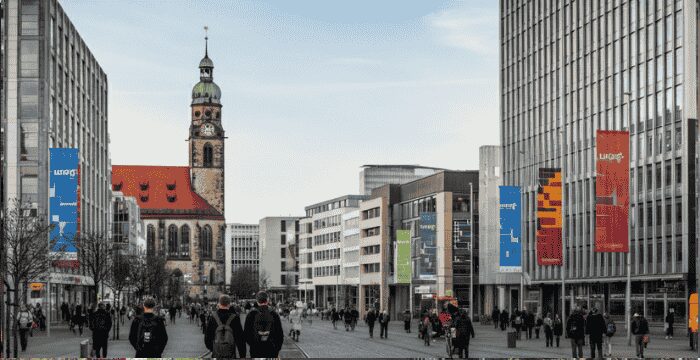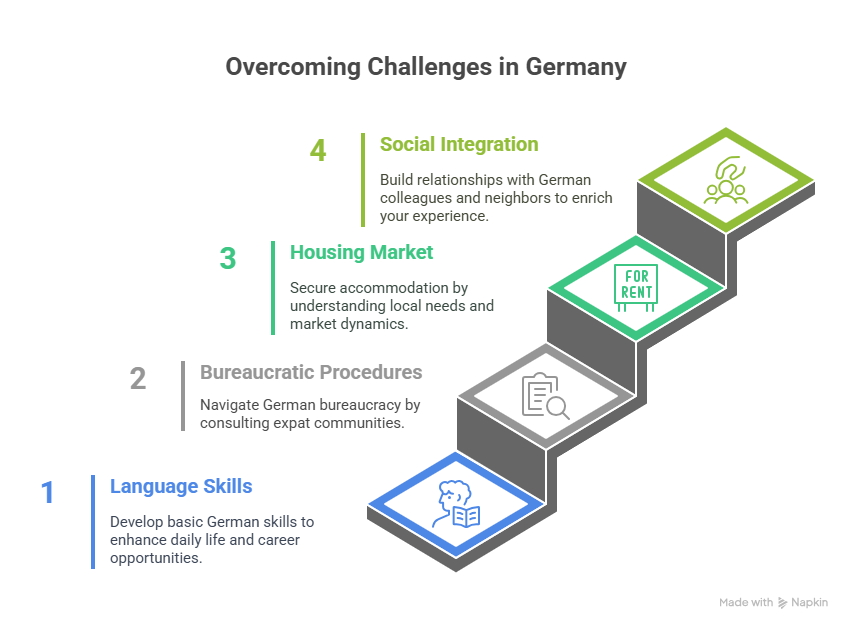Do you wish you had a balanced work-life, a world-class education, and a cleaner environment? Discover if moving to Germany from India is your next big leap—and how to make it happen in 2025! Moving to Germany from India has become one of the most sought-after immigration choices for Indian professionals, students, and families in 2025. Considering that more than 200,000 Indians are currently living in Germany, and that they constitute the largest proportion of foreign students and a significant percentage of the qualified labour force, the trend is unlikely to stop soon. The German government’s introduction of streamlined visa processes has shortened wait times by up to 30%, making the dream of relocating more achievable than ever before.
Latest Facts & News (2025): Why Moving to Germany from India Is Trending
The landscape of moving to Germany from India has transformed dramatically in 2025, with several key developments making Germany an even more attractive destination:
- Germany has become the leading destination of Indian professionals and students, with more than 200,000 Indians now residing there
- The German government has transformed the way visas are issued by reducing the waiting time by 30 per cent through the use of digital services and simplification of the application process.
- Instead, Germany needs approximately 400,000 skilled workers annually, primarily in IT, engineering, and healthcare.
- The minimum salary level set in the EU Blue Card will be changed to the amount of 45,300 euros for shortage jobs in 2025
- Indian students continue to benefit from Germany’s tuition-free public universities, with an average monthly living cost of €934.
- There are new linguistic courses and enhanced integration programs explicitly tailored to Indian migrants.
- The most popular destinations and choices among Indian expats are still Berlin, Munich, Frankfurt, Hamburg, and Düsseldorf.
- New polls show a 20 per cent upsurge in the number of Indian families requesting permanent residency since 2023.
| Statistic | Value |
| Indian Population in Germany | 200,000+ |
| Visa Processing Time Reduction | 30% faster |
| Annual Skilled Worker Shortage | 400,000 positions |
| EU Blue Card Minimum Salary | €45,300 (shortage occupations) |
| Average Monthly Living Cost | €934 |
| Current Date | Friday, June 27, 2025 |
Why Move to Germany from India in 2025?
- Moving to Germany from India offers compelling advantages that extend far beyond economic opportunities. Germany’s robust economy, ranked as Europe’s largest, provides stability and growth prospects that many Indians find irresistible84. The country’s commitment to work-life balance, with regulated working hours and generous vacation policies, stands in stark contrast to the demanding work culture many professionals experience in India.
- The education system is another major draw for families considering a move to Germany from India. With very little or no tuition fees, German public universities offer high-quality education to students, making quality higher education more affordable to Indian students than ever before. This educational advantage extends to the entire family, as children benefit from Germany’s excellent public school system.
- German healthcare and social security are comprehensive systems that are much more than what the majority of people in India enjoy at home. The country’s universal healthcare system ensures that residents receive quality medical care without the financial burden often associated with private healthcare in India.
| Index | India | Germany |
| Quality of Life | 124.65 | 195.05 |
| Safety | 55.75 | 60.50 |
| Healthcare | 65.51 | 71.65 |
| Pollution | 72.81 | 28.83 |
| Climate | 64.52 | 82.75 |
The environmental benefits of moving to Germany from India cannot be overstated. Germany’s pollution index of 28.83, compared to India’s 72.81, means significantly cleaner air, water, and overall environmental quality. The result of such an improved environmental setup tends to equate to a decrease in disease rates and health conditions among Indian families undergoing the transition process.
How to Move to Germany from India: Step-by-Step Process in 2025?
Understanding how to move to Germany from India involves navigating a structured process that has been significantly streamlined as of 2025. The German government’s focus on attracting skilled international talent has resulted in clearer pathways and faster processing times for Indian applicants.
The journey of moving to Germany from India typically involves the following essential phases: selecting and applying for a visa, preparing and verifying documents, planning finances and providing proof of funds, arranging accommodations, and completing post-arrival registration procedures. Each phase requires thorough and detailed consideration, along with compliance with specific timeframes, to ensure a smooth transition through all the changes.
Selecting the Right Visa for Your Purpose
- The first crucial Step in moving to Germany from India involves choosing the appropriate visa category that aligns with your purpose and qualifications. There are several visa types available in Germany, each tailored to specific situations and career objectives.
- The Skilled Work Visa is the primary channel used by Indians who possess relevant credentials and employment. This visa grants direct entry to the German labour market and may lead to permanent residency. It has been accelerated in 2025, and fast-track processing can be obtained in case of some shortage occupations.
- The student visa continues to attract many Indian students seeking quality education at affordable rates. English programs are available in German universities, which is why they are available to Indian students as they study German. The student visa also provides opportunities for part-time employment, allowing students to earn a living.
- The Job Seeker Visa is a special feature that allows skilled individuals from India to enter Germany and seek employment in the country within a period of up to six months. This visa has gained popularity because professionals can experience the job market firsthand and network with prospective employers.
- The EU Blue Card is the high-end version for highly qualified workers, offering excellent opportunities to obtain permanent residence and numerous rights. This option is affordable to a large number of Indian professionals because of the minimum salary requirement of 2025 of 45,300 euros for shortage occupations.
| Visa Type | Purpose | Duration | Work Rights | Path to PR |
| Work Visa | Employment with a job offer | Job contract duration | Full work rights | After 5 years |
| Student Visa | University studies | Study duration | Part-time (120 days/year) | After studies + work |
| Job Seeker Visa | Job hunting | 6 months | No work rights | After finding a job |
| EU Blue Card | Highly skilled professionals | 4 years | Full work rights | After 21 months |
| Family Reunion | Join family members | Varies | Depends on sponsor | After 5 years |
Through the Family Reunion Visa, Indians can be included by their spouses or any family member who is already legally residing in Germany. This route has specific needs for accommodation, economic stability, and financial resources to facilitate integration.
Document Checklist for Moving to Germany in 2025
Moving to Germany from India successfully requires meticulous document preparation, as requirements vary based on visa type and individual circumstances. In 2025, the German authorities have computerised most of the procedures; yet, tangible documents are still necessary for verification.
Important Documents for all kinds of Visas:
- Valid passport of 12 months validity and blank pages to stamp the visa
- Biometric photographs of passports of the German specifications
- The degree recognition and educational certificates in the ANABIN database
- Evidence of funds, usually by blocked accounts, indicating 11,208 per annum
- Day-one coverage on health insurance in Germany
- Good criminal record report by the Indian government
Other Documents by Type of Visa:
Regarding work visas, work candidates must have an employment agreement and an employer declaration, as well as identification of professional qualifications. The student visa applicants are required to submit admission letters from the university, academic transcripts, and language proficiency certificates. Job-seeking visa applicants are expected to have an elaborate CV, a detailed evaluation of their qualifications, and documentation of their professional life.
In 2025, authenticating and notarizing documents has become an easier task, as most Indian records are now accepted with apostille-certified documents instead of the current embassy attestation. This has lowered processing time and cost to Indian applicants.
Financial Planning and Cost of Living
Moving to Germany from India requires substantial financial planning, as the cost of living in Germany is significantly higher than in India. As recent statistics show, expenses in Germany are 204 per cent more than in India, so one would have to be very economical and plan their finances accordingly.
Initial Setup Costs for Moving to Germany from India:
| Expense Category | Estimated Cost (EUR) | Notes |
| Visa Application Fees | 75–150 | Varies by visa type |
| Flight Tickets | 600–1,200 | Depends on the season and booking time |
| Initial Accommodation | 1,000–2,000 | First month rent + deposit |
| Health Insurance Setup | 100–200 | First month premium |
| Blocked Account | 11,208 | Required for students/some visas |
| Document Translation | 200–500 | Certified translations |
| Total Initial Investment | 13,000–15,000 | Approximate range |
Monthly Expenditure on Living Costs in the leading cities in Germany:
The cost of living varies significantly between German cities, with Munich and Frankfurt being the most expensive. In contrast, cities like Leipzig and Dresden offer more affordable options for Indians moving to Germany from India.
| City | Rent (1BR) | Food & Groceries | Transportation | Total Monthly |
| Munich | €1,200-1,500 | €300-400 | €70 | €1,570-1,970 |
| Berlin | €800-1,200 | €280-350 | €86 | €1,166-1,636 |
| Frankfurt | €1,000-1,400 | €320-400 | €90 | €1,410-1,890 |
| Hamburg | €900-1,300 | €300-380 | €80 | €1,280-1,760 |
| Cologne | €800-1,200 | €290-370 | €85 | €1,175-1,655 |
Indians moving to Germany from India should budget approximately € 1,200-€2,000 per month for a comfortable living, depending on the city and lifestyle choices. The students can survive with 934 Euros per month as demanded by the German authorities, yet this is a basic standard of living.
Finding Accommodation in Germany in 2025
Securing accommodation represents one of the most challenging aspects of moving to Germany from India, particularly in major cities where demand significantly exceeds supply. The German rental process differs from the case in India, and therefore, laws and documents must be met that are understood by Indian expats.
Types of Accommodation Available:
- Student Residences offer the most affordable alternative for Indian students, with an average monthly price of 280 EUR. Such accommodations are, however, highly competitive, and the application must be submitted only after one has been accepted to the university.
- Shared Flats (WG – Wohngemeinschaft) represent the most popular choice among young Indians moving to Germany from India. These schemes include community kitchens and bathrooms, as well as individual bedrooms. The prices vary between $ 266 and $ 790 per month, depending on the city.
- The Private Apartments offer absolute autonomy and are more expensive in both financial and documentation terms. Landlords usually require a Schufa credit report, an employment contract, and a salary statement, which new immigrants are often unlikely to have.
Solutions of Temporary Accommodation:
Many Indians successfully moving to Germany from India start with short-term rentals through platforms like Airbnb or Wunderflats while searching for permanent housing. This strategy will give them time to familiarise themselves with local markets and needs without any pressure.
Registration and Settlement
The final phase of moving to Germany from India involves crucial administrative steps that must be completed promptly after arrival. The German bureaucracy requires specific steps, which at first appear complex, but with the proper guidance, they become commonplace.
Short-Term Post Arrival Needs:
- Address Registration (Anmeldung) must be completed within two weeks of arrival at the residents’ registration office. This registration serves as the basis for all other administrative procedures, including residence permits, bank accounts, and activation of health insurance, among others.
- The residence permit application follows address registration and requires appointments at the local Foreigners’ Office (Ausländerbehörde). Processing times vary by city, and appointments should be scheduled as soon as possible.
- The salary account opening facilitates the payment of salaries and simplifies daily financial operations. Online banks, such as N26 and Revolut, offer a more convenient account opening process for new clients, whereas traditional banks may require proof of residence and a permit.
- Health Insurance Activation is a service that guarantees instant care coverage. Indians moving to Germany from India must choose between public and private insurance, with public insurance generally recommended for most situations.
Is It Worth Moving to Germany from India in 2025?
The question of whether moving to Germany from India is worthwhile depends on individual circumstances, career goals, and personal priorities. The existing experiences of the over 200,000 Indians settled in Germany, combined with current data, provide valuable guidelines for this life-altering decision.
Financial Considerations:
Although the cost of living in Germany is 204 per cent more than in India, salaries in Germany usually cover this gap, allowing for the ability to save more than in India. German IT professionals receive between 66,000 and 81,000 euros a year, whereas an engineer earns anything between 64,000 and 120,000 euros, a significant gap compared to the Indian pay.
Betterments in the Quality of Life:
The quality of life index for Germany (195.05) significantly exceeds that of India (124.65), reflecting improvements in safety, healthcare, environmental quality, and overall living standards. Such advantages are worth the increased prices to the families that care about health and environmental issues.
Growth Opportunities in Career:
Germany’s skills shortage in IT, engineering, and healthcare creates abundant opportunities for Indian professionals. The structured career progression, professional development opportunities, and work-life balance often surpass what’s available in India’s competitive job market.
Comparing Life in India vs Germany
Moving to Germany from India entails significant lifestyle adjustments that impact daily routines, social interactions, and long-term planning. Knowing about these differences will allow you to form realistic expectations and get ready for the transition.
Differences in the Professional Environment:
Adjustments: social and cultural:
| Aspect | India | Germany |
| Working Hours | Often 50+ hours/week | Regulated 40 hours/week |
| Vacation Days | 10-15 days annually | 25-30 days annually |
| Work-Life Balance | Often work-focused | Strictly maintained |
| Career Progression | Rapid but competitive | Structured and merit-based |
| Job Security | Variable | High with strong labour laws |
Social and cultural adjustments:
Indians moving to Germany from India often experience cultural differences in communication styles, social interactions, and daily routines. Germans are communicative people who may appear direct at first, yet they are also punctual and adhere to rules on another level.
Financial Comparison:
In Germany, Indians have a better chance of financial security (salaries are higher, social benefits thorough, and savings opportunities systematic) in spite of higher living expenses. The social security program will ensure unemployment compensation, medical coverage, and pension contributions, providing financial stability in the long run.
Common Challenges and How to Overcome Them in 2025
Moving to Germany from India presents several challenges that most Indian expats encounter during their initial settlement period. Knowledge of the challenges and their resolutions helps ensure that everything goes smoothly during the transition.
Language Barriers:
The level of requirements in the German language depends on the profession and geography, but the minimum skills ones will positively contribute to everyday life and professional opportunities. Many Indians successfully moving to Germany from India start with English-speaking roles while attending German language courses in the evenings.
Bureaucratic Procedures:
German management requires a lot of documentation and specific processes, which can be perceived as a daunting task at first. To overcome these requirements, it is best to join Indian expat communities and consult with experienced immigrants who have already made the transition.
Competition in the Housing Market:
The rental market is competitive, especially in major cities, and requires persistence and thorough documentation. The temporary provision of accommodation, followed by a gradual realisation of local needs, usually turns out to be more effective than the immediate initiation of decisions concerning permanent housing.
Social Integration:
Building social networks beyond the Indian community can be time-consuming and expensive, but it will significantly support the German experience. It is better to visit the local activities, sports clubs, and other events in the neighbourhood and build meaningful relationships with German colleagues and neighbours.
Perma-Residency and Citizenship avenues
Moving to Germany from India with long-term settlement goals requires understanding the pathways to permanent residency and eventual citizenship. Germany’s immigration system provides clear routes for Indians who meet specific requirements and demonstrate successful integration.
Requirements of Permanent Residency:
After five years of legal residence in Germany, Indians can apply for permanent residency (Niederlassungserlaubnis)15. The requirements include stable employment, adequate German language skills (B1 level), pension contributions, and clean criminal records.
Benefits of the EU Blue Card:
Approximately 21 months (for B1 German language proficiency) or 33 months (for A1 German language proficiency), EU Blue Card holders can apply for permanent residency. This accelerated pathway makes the Blue Card particularly attractive for highly qualified Indians moving to Germany from India.
Citizenship Pathway:
German citizenship becomes available after eight years of legal residence (reduced to six years with integration course completion). Dual citizenship is now accepted, allowing Indians to retain their Indian passports and enjoy the benefits of German citizenship.
| Criteria | EU Blue Card Holders | Regular Visa Holders |
| Permanent Residency | 21-33 months | 5 years |
| Citizenship Eligibility | 6-8 years | 8 years |
| Language Requirement | B1 German | B1 German |
| Integration Course | Recommended | Required |
Indian Communities and Cultural Life in Germany in 2025
The experience of moving to Germany from India is significantly enhanced by the vibrant Indian communities established in major German cities. These communities offer cultural maintenance, instrumental aid, and a network of friends that helps in smoothing the transition process.
Cities of Major Indian Communities:
- There is a large Indian community in Berlin, Germany, comprising various cultural organisations, Indian restaurants, and frequent cultural festivals. The city’s international atmosphere makes it particularly welcoming for Indians moving to Germany from India.
- Numerous Indian professionals working in the technology and automotive sectors are drawn to Munich. There are several Indian cultural centres, as well as frequent Bollywood events, in the city.
- Frankfurt is a financial centre and has a large number of Indian professionals, especially in the banking and financial sector.
- Other cities with a vibrant Indian population include Hamburg and Cologne, which also host regular cultural associations and festivals.
The Cultural Support Systems:
- Cultural ties are promoted through major festivals, such as Diwali, Holi, and Dussehra, which are organised by Indian communities. The events also serve as a means of networking among new and existing residents.
- The cross-sectional group of the Indian people is catered to by religious establishments such as Hindu temples, Sikh gurudwaras, and Islamic centres in Germany. Such establishments do not always offer purely religious services, but they may also provide community assistance and cultural education to children.
Conclusion
Moving to Germany from India in 2025 presents an exceptional opportunity for qualified professionals, students, and families seeking improved quality of life, career growth, and long-term stability. Easy visa procedures, the great demand for skills, and an open policy towards Indian immigrants create favourable conditions for a successful move. The decision to move to Germany from India requires careful consideration of personal circumstances, career goals, and family priorities. Although the early difficulties of adjusting to a new language, bureaucracy, and culture are genuine, the benefits of ample salaries, work-life balance, high-quality healthcare, and a good environment usually outweigh the efforts and commitment required.
Indians who are contemplating such a life-changing Step should start it in 2025. The German government’s commitment to attracting international talent, combined with the established Indian community and support systems, creates an environment where moving to Germany from India can lead to successful long-term settlement and prosperity. Begin your research today, meet with immigration consultants, and start the process of making your German dream a Reality. The journey of moving to Germany from India begins with proper planning and determination, but the rewards of this decision can transform your life and future generations. VisaBabu will do everything possible to help you achieve your goals.
FAQs (Frequently Asked Questions)
Q1: Is it possible that Indians can live in Germany permanently?
Ans. There are several ways by which Indians can permanently settle in Germany. Yes. Indians can obtain permanent residence after five years of legal residence and employment, as well as good knowledge of the B1 level of the German language. EU Blue Card holders can achieve permanent residency in just 21-33 months, making it an attractive option for highly qualified professionals moving to Germany from India.
Q2: How can I go to Germany from India?
Ans. Indians can move to Germany from India without a job through several routes. The Job Seeker Visa allows for six months to find employment, student visas enable study with part-time work opportunities, and the new Opportunity Card (Chancenkarte) provides skilled professionals with job-hunting opportunities. Both options require specific qualifications and financial requirements.
Q3: How much is the lowest salary of the Blue Card in Germany?
Ans. The minimum salary in the EU Blue Card scheme for 2025 will be 58,400 euros per year for regular jobs and 45,300 euros for shortage professions, such as IT, engineering, and healthcare. This threshold makes the Blue Card accessible to many Indian professionals considering moving to Germany from India, particularly those in high-demand sectors.
Q4: Which German city is the best one for Indians?
Ans. Berlin has the largest Indian community and a global setting, making it an ideal destination for newcomers. Munich offers a good scope in the technological and automotive fields, whereas Frankfurt is the financial centre. The choice depends on career field, with IT professionals often preferring Berlin, automotive engineers choosing Munich, and finance professionals selecting Frankfurt when moving to Germany from India.
Q5: Are jobs easy in Germany to Indians?
Ans. Indians who possess relevant credentials and skills in the German language can secure good employment opportunities, especially in IT, engineering, and healthcare, where Germany is experiencing a significant skills shortage. The labour market has also been opened up in 2025 with a more straightforward visa process and increased opportunities in the English language. However, learning German significantly improves job prospects and career advancement potential for Indians moving to Germany from India.









